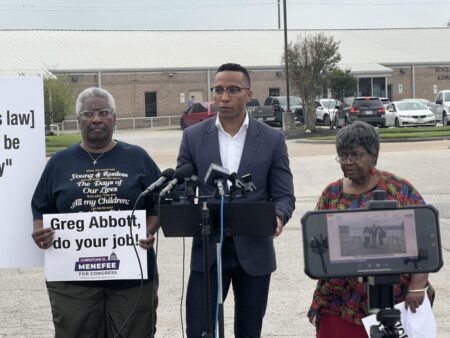Marquette Greene-Scott Launches Fresh Campaign to Regain Congressional Seat from Troy Nehls
Marquette Greene-Scott, who narrowly lost to incumbent U.S. Representative Troy Nehls in the 2024 election, has officially announced his intention to run again for the congressional seat. This renewed effort underscores a fiercely competitive rematch in a Texas district that remains a focal point for political strategists and voters alike. Greene-Scott’s campaign centers on revitalizing the local economy, expanding healthcare accessibility, and bolstering education funding, all framed within a commitment to equitable growth and community engagement.
Since launching his campaign, Greene-Scott has prioritized direct interaction with constituents through town halls and grassroots organizing, aiming to build stronger connections across the district. His key policy objectives include:
- Stimulating employment opportunities by supporting small enterprises and promoting environmentally sustainable industries
- Making healthcare more affordable by broadening Medicaid coverage and tackling high prescription drug costs
- Enhancing education through increased investment in public schools and expanding vocational training programs
| Policy Focus | Greene-Scott’s Initiatives |
|---|---|
| Economic Development | Grants for small businesses and incentives for renewable energy projects |
| Healthcare | Medicaid expansion and prescription drug price regulation |
| Education | Boost funding for K-12 education and vocational programs |
Insights from Greene-Scott’s 2024 Loss and Plans for a Stronger Campaign
Greene-Scott’s 2024 campaign encountered several obstacles that contributed to his defeat by Troy Nehls. Political analysts highlight factors such as uneven voter turnout, especially among younger and minority demographics, and a campaign message that failed to fully resonate within a district leaning toward the incumbent. These challenges emphasize the necessity for a more focused and data-informed approach moving forward.
To improve his chances in the upcoming election, Greene-Scott is expected to concentrate on:
- Deepening grassroots engagement: Strengthening ties with local communities to build trust and increase voter enthusiasm.
- Utilizing voter data analytics: Tailoring outreach efforts to target key demographics more effectively.
- Clarifying policy distinctions: Clearly differentiating his platform from Nehls to appeal to undecided voters.
| Challenge | Impact in 2024 | Approach for 2026 |
|---|---|---|
| Voter Turnout | Low participation among key groups | Robust mobilization and outreach campaigns |
| Campaign Messaging | Limited penetration in target communities | Focused, relatable messaging strategies |
| Fundraising | Outpaced by opponent | Expanded fundraising efforts and donor engagement |
Core Issues Driving the Nehls vs. Greene-Scott Congressional Contest
Healthcare remains a pivotal topic in this election cycle. Greene-Scott advocates for broader Medicaid coverage and initiatives to reduce the cost of medications, positioning himself against Nehls’ preference for market-based healthcare solutions. Mental health services and public health infrastructure are also under scrutiny, with both candidates proposing contrasting approaches to meet the district’s needs.
Economic policy is another critical arena of debate. Greene-Scott supports raising the minimum wage to $15 per hour, increasing public education funding, and incentivizing small business growth. Conversely, Nehls champions tax reductions and deregulation as mechanisms to spur economic expansion and job creation. The table below highlights the key differences in their policy platforms:
| Policy Area | Greene-Scott’s Stance | Nehl’s Stance |
|---|---|---|
| Minimum Wage | Raise to $15/hour | Keep current level |
| Taxation | Implement progressive tax reforms | Reduce corporate tax rates |
| Education | Increase funding for public schools | Support expansion of charter schools |
| Healthcare Access | Expand Medicaid coverage | Favor private insurance solutions |
Empowering Voters and Advocates Ahead of the Houston Congressional Election
With the Houston district election on the horizon, it is crucial for voters and community advocates to engage in well-informed decision-making. As Greene-Scott challenges Nehls once more, understanding each candidate’s policies on economic growth, healthcare, and infrastructure is essential. Participating in candidate forums, reviewing unbiased news coverage, and attending debates can equip voters with the knowledge needed to make choices aligned with their community’s priorities.
Advocates have a vital role in promoting voter participation and ensuring transparency throughout the campaign. Recommended focus areas include:
- Voter education programs that clarify registration processes and voting deadlines, particularly for first-time voters.
- Building coalitions with local groups to amplify voices on critical social and economic issues.
- Monitoring campaign communications to promote factual and transparent messaging.
| Focus Area | Recommended Voter Actions | Recommended Advocate Actions |
|---|---|---|
| Research | Examine candidate interviews and policy platforms | Distribute impartial voter information guides |
| Engagement | Attend public debates and forums | Organize interactive community town halls |
| Participation | Verify voter registration status and polling locations | Coordinate voter outreach and assistance programs |
Conclusion
As Marquette Greene-Scott embarks on a renewed campaign to challenge incumbent Troy Nehls, the upcoming election promises to be a closely watched contest that reflects shifting political currents within the district. Both candidates are presenting distinct visions for the future, making this race a critical indicator of voter sentiment in the region. Houston Public Media will continue to provide in-depth coverage and analysis as the election draws near.




